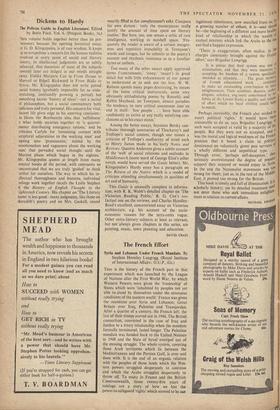Dickens to Hardy
?HIS volume holds together better than its pre- lecessors because the opening historical essay, iy G. D. Klingopulos, is of rare wisdom. It keeps ip so scrupulous a concern for the human realities nvolved at every point of social and literary iistory, its intellectual judgments are so subtly ,glanced, that essentials of most of the subjects :overed later are lodged in our minds straight may. Unlike Marjorie Cox in From Donne to Ilarvell or Edge11 Rickword in From Blake to 4yron, Mr. Klingopulos does not write potted ;ocial history (probably impossible for so wide- aretching, confusedly growing a period) but something nearer 'history of ideas'—not a recital Jf philosophies, but a social commentary both ludicious and truly personal. His concerrrfor vital, lecent life gives edge to his unerring concision : le likens the Benthamite idea that 'selfishness' s what holds societies together to 'a quarter- master distributing emergency rations,' and he :riticises Carlyle for 'remaining content with scriptural adjurations to the working man' and 'apsing into 'prussianism,' misled by the 'emotionalism and vagueness about the working non'. that pervaded social thought until the 'Marxist phase which began in the eighties.' Mr. Klingopulos quotes at length from many. :eminal books of the period, with comments so :oncentrated that we are truly 'guided' to think urther for ourselves. The way in which his in- allectual thoroughness and humane, individual 'eelings work together recalls the Leslie Stephen )f the History of English Thought in the Eighteenth Century. His chapter on 'The Literary scene' is less good : many judgments, like those on Meredith's poetry and on Mrs. Gaskell, sound
wearily filled in for completeness's sake. Compare his own dictum : 'only the masterpieces really justify the amount of time spent on literary studies.' But here, too, one senses a critic of rare intelligence, working in nutshell space. 'Fre- quently the reader is aware of a certain meagre- ness and repetitive immobility in Tennyson's words and images, but he submits to the poetry's manner and rhythmic insistence as to a familiar hymn or anthem. . .
Too many of the other essays apply approved terms ('concreteness,' irony,"major) in great detail but with little enhancement of our power to understand or to seek out the best. W. W. Robson spends many pages destroying, by means of the latest critical instruments, some very obviously attitudinising poems by Rossetti; and Robin Mayhead, on Tennyson, almost parodies the tendency to turn critical assessment into an end in itself : 'few people . . . have been able confidently to arrive at any really satisfying con- clusions as to his exact status.'
Among the better essays, Seymour Betsky con- tributes thorough summaries of Thackeray's and Trollope's social content, though one misses a criticism of Trollope's mediocrity of mind such as Henry James made in his early Notes and Reviews. Quentin Anderson gives a subtle account of the 'web' of social relations and outlooks in Middle/,arch (more word of George Eliot's other novels would have served the Guide better). Mr. Klingopulos's Hardy essay has a paragraph on The Return of the Native which is a model of criticism attending simultaneously to qualities of art and of humanity.
This Guide is unusually complete in informa- tion, with R. K. Webb's detailed chapter on 'The Victorian Reading Public,' R. G. Cox's too- factual one on the reviews, and Charles Handley- Read's excellent, concentrated essay on Victorian architecture, e.g. his account of the socio- economic reasons for the terra-cotta vogue. Other extra-literary, subjects at least as relevant, but not always given chapters in this series, are painting, music, town planning and education.
DAVID. CRAIG














































































 Previous page
Previous page